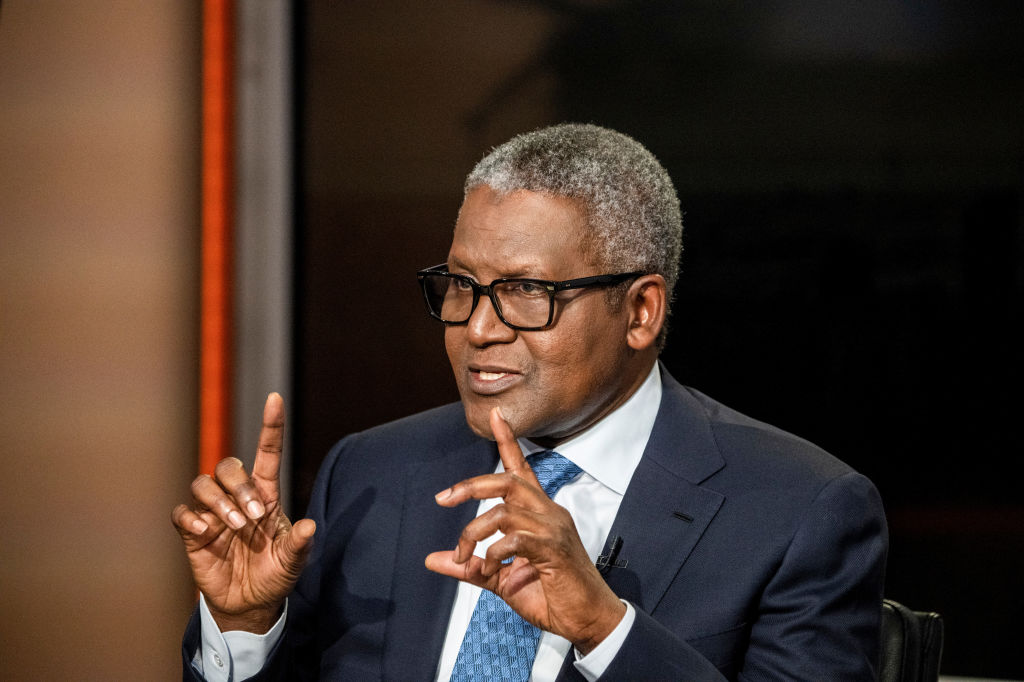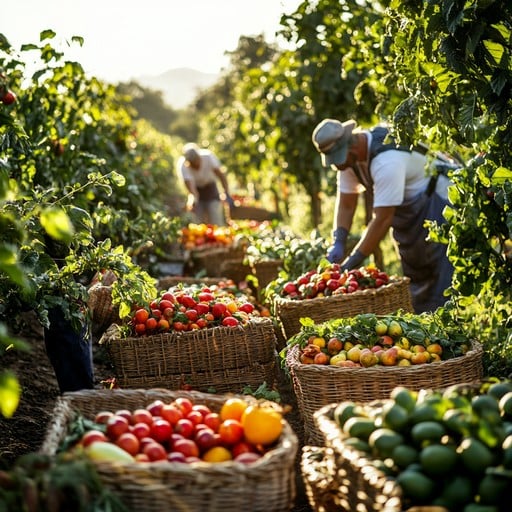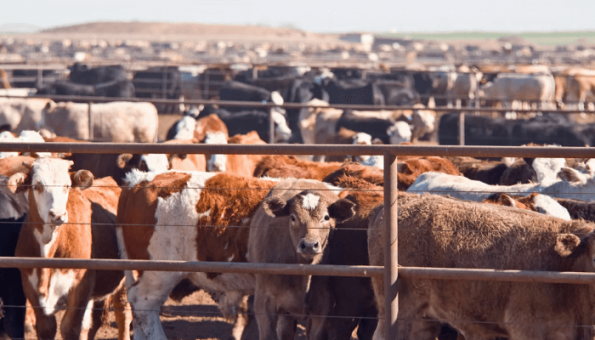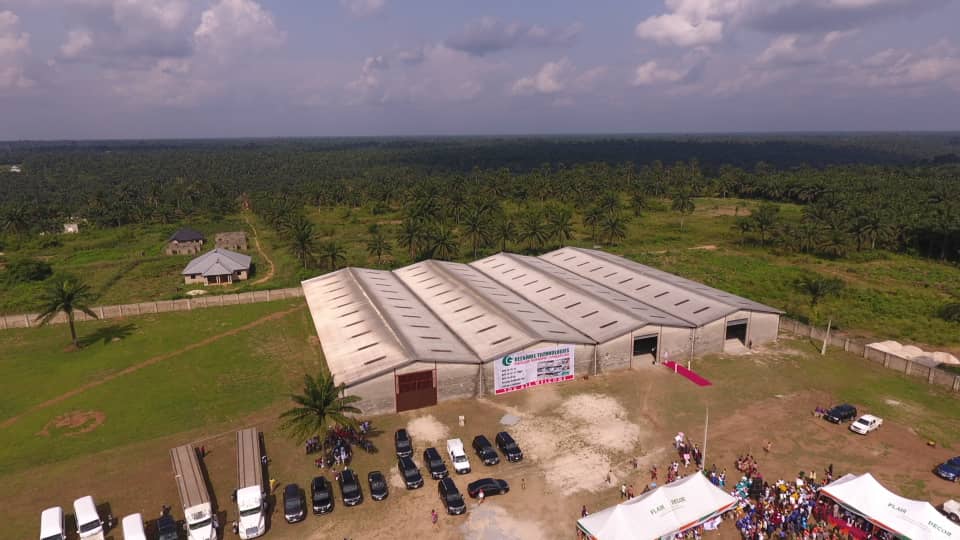Agriculture
Dangote urges prioritisation of food security in Africa

• AfricaRice seeks investments, public-private partnerships
President/Chief Executive of Dangote Industries Limited (DIL), Aliko Dangote, has called for the prioritisation of food security and self-sufficiency across Africa, stressing the continent’s vast agricultural potential.
Speaking at the weekend during a courtesy visit by the AfricaRice Centre—a pan-African Centre of Excellence for rice research, development, and capacity building—at his Lagos office, Dangote highlighted agriculture as a key pillar for sustainable development on the continent.
“Africa is richly endowed with arable land. With the right policies, adequate investment, and the adoption of modern technology, farmers can significantly increase their yields and return on investment,” he said.
He noted that strengthening agriculture could help tackle many of the continent’s socio-economic challenges, given its role as a major source of employment and income.
“With effective policy frameworks and technological advancement, Africa can achieve food security and become self-sufficient. Investing in agriculture will also unlock growth across various sectors of the economy,” Dangote added.
Dangote Rice Limited, a subsidiary of Dangote Industries, recently signed a N1.8 trillion purchase and sale agreement with Niger Foods Security Systems and Logistics Company Limited, owned by the Niger State Government. The agreement will ensure a steady supply of high-quality paddy rice to Dangote Rice in support of Nigeria’s broader food security agenda.
He said that Dangote Rice has made substantial investments in rice mills and plantations across Nigeria. Through its out-grower scheme, he explained, the company aims to create employment opportunities while promoting food self-sufficiency nationwide.
The Director General of AfricaRice, Dr Baboucarr Manneh, commended Dangote’s renewed focus on agricultural investments, describing it as a critical step towards achieving food security on the continent.
He also lauded the recently formalised partnership with Niger State, noting its potential to transform regional food systems.
“Niger State has set an ambitious target of producing five million tonnes of rice over the next five years. To put this into perspective, Africa currently imports around 15 million tonnes of rice annually. If realised, this target will have a significant impact on rice self-sufficiency and food security in Africa,” said Dr Manneh.
He emphasised the importance of leveraging public-private partnerships to strengthen the agricultural ecosystem, combining government leadership with private sector expertise and investment.
“This partnership can serve as a blueprint for other states and countries across the continent. With strong support from agricultural science and research, it can dramatically boost productivity and reduce Africa’s reliance on food imports,” he added.
Dr Manneh also called for better management of imports to support local farmers and strengthen domestic economies.
Also speaking during the visit, Executive Chairman, Niger Foods, Sammy Adigun, reaffirmed the state’s commitment to transforming rice production. He revealed that AfricaRice is set to support Niger State in increasing annual rice paddy production from the current 1.5 million tonnes to 10 million tonnes, through the deployment of climate-smart technologies, mechanisation, innovation, and the integration of both large-scale and smallholder farms.

Agriculture
Poor storage, bad roads threatening food security, farmers warn

By Olamide Akintunde
Nigeria’s aspiration for sustainable food security is threatened by insufficient food storage facilities and a poor rural-urban road network. This was the submission of the chairman, Oyo State chapter, All Farmers Association of Nigeria (AFAN), Adewumi Abas, in Ibadan today.
Abas called for government assistance to save farmers from the horror of watching their perishable goods, such as tomatoes and peppers, being destroyed helplessly due to inadequate storage facilities.
According to him, some perishable crops must be harvested almost every three days, whether there is a market for them or not.
“Once the quality of such crops starts diminishing, their market value will start declining, leading to shortages for farmers. This, among others, contributes to the high cost of food in the country.
“Our prayer is that the government would invest in storage and food preservation facilities; farmers’ associations will gladly key into the project through acquisition or the rental of such facilities,” he said.
The chairman also lamented that the nation’s poor rural-urban road network has been a major excuse for transporters to exploit farmers during the harvest period.
In addition, he said, farmers were confronted with the inadequacy of vehicles to get their crops to markets at the appropriate time.
According to him, transporters always avoid bad rural roads, claiming that the roads can damage their vehicles.
“Most times, farmers face the task of using their heads to carry harvested crops to nearby locations where vehicles can reach and take them to the markets.
“This always leads to double expenses because labourers who would carry the goods with head pans will collect money as well as the drivers.
“This has been one of the factors reducing farmers’ profit margin, adding to the cost of foodstuffs in the market because farmers would definitely spread all the expenses on the market price,” he said.
Nevertheless, he lauded the Oyo government for improving security, especially for farmers in the state’s rural areas.
Abas noted that the Western Nigerian Security Network, codenamed ‘Amotekun’, and the NSCDC Agro-Ranger Squad had brought relative peace across rural areas in the state.
He, however, urged the government not to relent on farmers’ security, particularly during the dry season when herdsmen usually move around in search of green grass for their animals.
The chairman also lamented that many farmers could not recoup their investment due to the sharp drop in produce prices.
He attributed this to the government policy that permitted mass importation of foodstuffs with little or no consideration for local farmers.
He noted that many cassava farmers lost their investments in the current harvest season.
Agriculture
Fed govt.’s 10-year livestock growth plan to boost food security

The Federal Government has unveiled the National Livestock Growth and Advancement Strategy (NL-GAS), a two-phased 10-year plan aimed at transforming Nigeria’s livestock sector into a key driver of food security and economic growth.
The strategy was presented by the Minister of Livestock Development, Alhaji Idi Mukhtar Maiha, during the Economic Management Team (EMT) meeting.
According to the Minister, NL-GAS sets out a roadmap to double the national herd size and expand sectoral output by at least 100 per cent by 2035, with implementation anchored on strong collaboration between the public and private sectors.
Minister of Finance and Coordinating Minister of the Economy, Wale Edun, said NL-GAS is consistent with the Federal Government’s broader economic reform programme. He explained that the livestock strategy reflects a deliberate effort to attract investment and reduce reliance on food imports.
“Initiatives such as NL-GAS align with our reform agenda and demonstrate government’s commitment to unlocking investment and enhancing food security,” Edun said. “The objective is to lay a foundation for sustainable, private-sector-led growth that will deliver long-term benefits to Nigerians.”
The launch coincided with a review of Nigeria’s economic performance and sectoral priorities by the EMT. Officials noted continued signs of stability, attributing the trend to a competitive exchange rate and disciplined reforms.
Agriculture
Stakeholders push for increased govt support for $1.5b Akwa Ibom fertiliser complex

Key industry players and agricultural experts are intensifying calls for greater government support for the ongoing $1.5 billion Akwa Ibom Fertiliser Complex. The project, they agreed, is a pivotal investment that will not only catalyse Nigeria’s food industry but also fortify the burgeoning economic partnership between Nigeria and the Kingdom of Morocco.
The project, planned for Ikot Abasi in Akwa Ibom State, was projected to begin during the second quarter of this year, but its acceleration has not been impressive.
The planned complex will produce ammonia, Di-Ammonium Phosphate (DAP), and NPK fertiliser. It is viewed as a game-changer for the agricultural sector, which accounts for a significant portion of the nation’s gross domestic product (GDP) and employs a large percentage of its workforce.
When fully developed, the complex should produce 1.5 million tonnes of ammonia per annum in two phases.
About 60–70 per cent of the ammonia will be exported to Morocco, while the rest will be used to produce DAP and NPK fertilizers for domestic use. The project will require about 150 million standard cubic feet of gas for both phases.
Agricultural experts pointed out that the complex’s output would not only meet domestic demand but also position Nigeria as a major exporter of fertilizer to other African nations.
The Director-General, African Centre for Supply Chain (ACSC), Dr. Obiora Madu, underscored the complex’s strategic importance.
He highlighted how the facility, a joint venture between the Nigeria Sovereign Investment Authority (NSIA) and OCP Africa, a subsidiary of Morocco’s OCP Group, is designed to leverage Nigeria’s abundant natural gas resources and Morocco’s rich phosphate rock reserves.
Madu stressed that the synergy is a model for continent-wide cooperation and a tangible expression of a mutually beneficial economic relationship.
The project is structured to produce ammonia for export to Morocco while also manufacturing significant quantities of DAP and NPK fertilisers to meet Nigeria’s domestic demand, thereby reducing the nation’s reliance on imported fertilisers and conserving scarce foreign exchange.
He described the project as a “cornerstone” of Nigeria’s efforts to diversify its economy and strengthen its agricultural sector. The partnership with Morocco, specifically through OCP, a global leader in the phosphate and fertilizer industry, positions Nigeria to become a regional powerhouse in fertilizer production. This collaboration, he continued, “extends beyond just commerce, as it aligns the two nations’ strategic interests in promoting food security and sustainable development across Africa.”
In an interview, Director General/Chief Executive, the Pan-African Fertiliser Industry Association (PAFIA), Dr. Innocent Okuku, emphasised the transformative potential of the complex for Nigeria’s food security. He explained that a domestic fertiliser production hub of this scale would provide Nigerian farmers with a consistent and affordable supply of high-quality fertilizers.
“Such investments are crucial for job creation and supporting the agricultural sector. It’s good to start looking at Nigeria as a significant contributor to the global market in terms of using natural resources that we have,” he said.
He also praised the cooperation with OCP of Morocco, calling it a “positive element for countries of strengthening those ties.”
The Akwa Ibom complex, he argued, would help to stabilize prices, increase fertilizer consumption per hectare, and ultimately lead to a significant boost in crop yields and overall food production. “By producing high-quality, customized fertilizers adapted to our unique soil needs, this plant will help our farmers achieve higher yields and better crop quality. This will not only increase farmers’ income but also strengthen our position in the global agricultural market, earning valuable foreign exchange for the country,” he said.
According to him, the project is a crucial step toward building a robust and resilient agricultural value chain. He noted that the economic benefits of the complex are projected to be far-reaching.
In his remarks during a recent stakeholders’ meeting in Uyo, Akwa Ibom State Governor Pastor Umo Eno expressed readiness to partner with the NSIA and OCP Africa in four key investment areas. He noted that his government is “willing and ready to partner with experts in different areas to further development in the State and make good his campaign promises as contained in the ARISE Agenda.”
He then set up a team on the government side—including the Managing Director of the Akwa Ibom Investment Corporation (AKICORP), Pastor ImoAbasi Jacob; Commissioner for Agriculture, Dr. Offiong Offor; Executive Director of Agriculture Investment, Pastor Godwin Ukwat; and immediate past Chairman of Foreign Direct Investment (FDI) in the State, Mr. Gabriel Ukpe—to liaise with the selected members on the investors’ team to facilitate the process.
The NSIA, a key partner in the venture, noted that the project will create approximately 500 direct jobs and an estimated 20,000 indirect jobs during the construction and operation phases. These opportunities, from skilled labor at the plant to logistics, distribution, and agro-dealer networks, are expected to significantly reduce unemployment and improve livelihoods, particularly within the host communities in Akwa Ibom State.
The NSIA’s Managing Director/Chief Executive, Aminu Umar-Sadiq, said the visit was to discuss three key areas of investment, including ammonia production, a coconut refinery, and green agriculture.
“We came on a visit to the Governor along with our partners called OCP Africa to discuss three areas of investment,” Umar-Sadiq said. “First is around ammonia production and the ammonia phosphate plant. The second is around the coconut refinery that is in Akwa Ibom State that is underutilized. NSIA and OCP want to bring their financial and agricultural expertise in order to enhance the utilization of the coconut refinery and backward integrate toward the production of coconut in the state. The third area of collaboration is that there are green houses that are also underutilized for which OCP has extensive expertise and capital to put those green houses into effective use.”
He also added a fourth area: “putting in place a blending unit so that there can be a plant for blending fertilizers in Akwa Ibom State.”
Umar-Sadiq stated that NSIA and OCP have for the last six years jointly run a program called the Presidential Fertilizer Initiative, where Nigeria has imported phosphate fertilizer from OCP. This project, he explained, is “an attempt to actually backward integrate to begin to produce the ammonia phosphate locally in Nigeria.”
According to him, when executed, the project will “ensure significant wealth creation, incredible job opportunities and make the State a hub for industrial activities.”
The stakeholders’ call is a clear message to the government: timely and robust support for the Akwa Ibom Fertiliser Complex is not just an investment in a single project but a strategic commitment to the future of Nigeria’s economy, its food industry, and its vital relationship with a key continental partner.
-

 Art & Life9 years ago
Art & Life9 years agoThese ’90s fashion trends are making a comeback in 2017
-

 Entertainment9 years ago
Entertainment9 years agoThe final 6 ‘Game of Thrones’ episodes might feel like a full season
-

 Business9 years ago
Business9 years agoThe 9 worst mistakes you can ever make at work
-

 Art & Life9 years ago
Art & Life9 years agoAccording to Dior Couture, this taboo fashion accessory is back
-

 Entertainment9 years ago
Entertainment9 years agoThe old and New Edition cast comes together to perform
-

 Sports9 years ago
Sports9 years agoPhillies’ Aaron Altherr makes mind-boggling barehanded play
-

 Entertainment9 years ago
Entertainment9 years agoMod turns ‘Counter-Strike’ into a ‘Tekken’ clone with fighting chickens
-

 Entertainment9 years ago
Entertainment9 years agoDisney’s live-action Aladdin finally finds its stars




